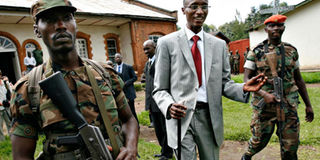Congo rebel Nkunda arrested

Congolese rebel leader Laurent Nkunda in the village of Jnomba in eastern Congo. Photo/ REUTERS
What you need to know:
- Arrest occurred during a joint Congolese-Rwandan military operation launched this week.
- Nkunda has led a Tutsi rebellion in eastern Democratic Republic of Congo since 2004 and is wanted for war crimes.
- Rwandan Hutu rebel FDLR movement widely viewed as the root cause of instability in east Congo.
GOMA, Congo
Rwanda and Congo on Friday announced the arrest in Rwandan territory of Congolese Tutsi rebel leader Laurent Nkunda during a joint military operation against rebels on their Great Lakes border.
Rwanda’s Military Spokesman Maj. Jill Rutaremara told Daily Nation that Gen. Nkunda is now being held in Gisenyi in Rubavu district after being arrested Thursday night in the on-going Rwanda-DRC, joint military offensive against rebel forces in eastern Congo.
"Nkunda was arrested yesterday (Thursday) in the night while he was fleeing on Rwandan territory. His small group had resisted the offensive of the joint military troops,” Maj. Rutaremara said.
"His arrest came after a collision involving a CNDP splinter group that committed to support the joint military plan against the Ex-FAR/ Interahamwe and his small group he was still leading. He crossed to Rwandan territory in Rubavu and he is now being held in Gisenyi.”
According to Madnodje Mounoubai, a spokesman for MONUC, the UN peace keeping mission in DRC, his forces first tried to capture the Tutsi rebel leader late Thursday evening near Bunagana.
"We think this is a major development in the peace process. It could cause the remaining soldiers still loyal to him to join the government forces and stop the fighting escalating in eastern Congo,” said Mounoubai.
A Congolese army colonel, who asked not to be named, said Nkunda and rebels loyal to him had fought against Rwandan and Congolese troops when they arrived on Thursday at Bunagana, a town on the border with Uganda in Congo's North Kivu province.
But a rebel associate of Nkunda, Jean-Desire Muiti, disputed the account of his arrest, saying the rebel leader had gone to Rwanda late on Thursday after being "called for consultations".
Nkunda has led a Tutsi rebellion in eastern Democratic Republic of Congo since 2004 and is wanted for war crimes.
Congo's government said they would seek Nkunda's extradition from Rwanda and that his detention could end the activity of one of the most powerful and feared eastern rebel groups, recently split by a leadership dispute.
Congolese and Rwandan military commanders said Nkunda was detained after he and three battalions of his fighters tried to resist the joint Congolese-Rwandan operation which was launched this week to hunt Rwandan Hutu militiamen operating in Congo.
In the operation, marking unprecedented cooperation between the Great Lakes neighbours after years of mutual suspicion and hostility, more than 3,500 Rwandan troops have crossed the border into Congo.
Wars, rebellions and ethnic violence since 1998 have killed more than 5 million Congolese, holding back the development of the huge former Belgian colony in central Africa, which is rich in minerals such as copper, cobalt, coltan, gold and uranium.
Congolese Information Minister Lambert Mende told Reuters Congo would seek Nkunda's extradition.
"There is a Congolese arrest warrant against him. He is Congolese. He committed his crimes in Congo. So it is normal that he would be judged in Congo," Mende said.
Nkunda's leadership of his Tutsi National Congress for the Defence of the People (CNDP) rebel group had been challenged this year by dissident rebel commanders who last week ended hostilities with the Congolese government.
Human rights groups said they would be watching how Rwanda and Congo dealt with Nkunda. His fighters are accused of mass killings and rapes, and recruitment of child soldiers.
"Nkunda and troops under his command have certainly committed serious atrocities, and he needs to be held to account in a trial that meets fair trial standards," said Anneke Van Woudenberg, senior Congo researcher with Human Rights Watch.
"He must be brought back to Congo and face justice for his acts, because he is responsible for many deaths due to the war he waged," said local Congolese pastor Crispin Kombozi.
The joint Rwandan-Congolese operation to try to disarm Rwandan Hutu FDLR rebels follows heavy international pressure for an end to more than a decade of conflict in Congo's east.
Congo had in the past accused Rwanda's government of backing Nkunda, while Rwanda had denounced Congolese army cooperation with the FDLR (Democratic Forces for the Liberation of Rwanda).
Many of the FDLR's 6,000 fighters took part in Rwanda's 1994 genocide in which Hutu soldiers and militia slaughtered 800,000 Tutsis and moderate Hutus. The FDLR presence in east Congo has been widely viewed as a root cause of the violence there.
Late last year, Nkunda, who said his rebels were fighting to defend Congo's Tutsi minority against the FDLR, led his CNDP guerrillas in a big anti-government offensive in North Kivu province which displaced more than a quarter of a million civilians, creating a humanitarian emergency.
The United Nations, which has 17,000-strong peacekeeping force in Congo that has been largely excluded from the joint Congolese-Rwandan anti-rebel operation, has expressed fears that civilians could suffer if fresh fighting breaks out.



